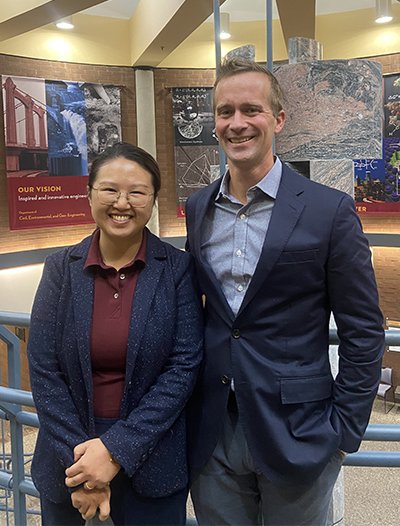Toward destruction of PFAS through ultraviolet advanced reduction processes
Quantifying Hydrated Electron-Based Contaminant Degradation in UV-Advanced Reduction Processes: Implications for Reductive Defluorination of Per- and Polyfluoroalkyl Substances
with Garrett McKay, Civil & Environmental Engineering at Texas A&M University
Abstract
Photochemistry is the process of light energy being converted into chemical energy, which is initiated by the interaction of molecules with photons. Photochemical reactions play critical roles in natural and engineered environmental systems, such as treatment technologies for abatement of chemical and microbiological contaminants and natural cycling of elements in aquatic systems. The rates and mechanisms of photochemical reactions are governed by properties of the light source, background water matrix, and intrinsic properties of the target contaminant. Garrett McKay and his research group apply these fundamental concepts to study photochemical reactions of important to surface water as well as engineered treatment systems. This presentation will focus on his group’s work to improve the performance of ultraviolet advanced reduction processes (UV-ARP) for the complete destruction of per- and polyfluoroalkyl substances (PFAS) in real world waters. McKay will describe results from studies by his group aimed at quantifying the key processes involved in UV-ARP and how this quantitative knowledge has impacted efforts to enhance PFAS destruction in challenging water matrices.
Speaker
Garrett McKay is an assistant professor in the Zachry Department of Civil & Environmental Engineering at Texas A&M University. His research group focuses on chemical processes occurring in natural and engineered systems, including environmental photochemistry, optical and photophysical characterization of carbon-based nanostructures, and treatment of emerging contaminants. McKay’s research has been sponsored by multiple grants from the National Science Foundation, including a CAREER Award, and an Early Career Award from the Army Research Office. He was also a recipient of the 2021 Excellence in Review Award from Environmental Science & Technology. McKay’s formal training includes a Ph.D. in environmental engineering from the University of Colorado Boulder, BA and MS degrees in chemistry from California State University Long Beach, and postdoctoral training at the Colorado School of Mines.
